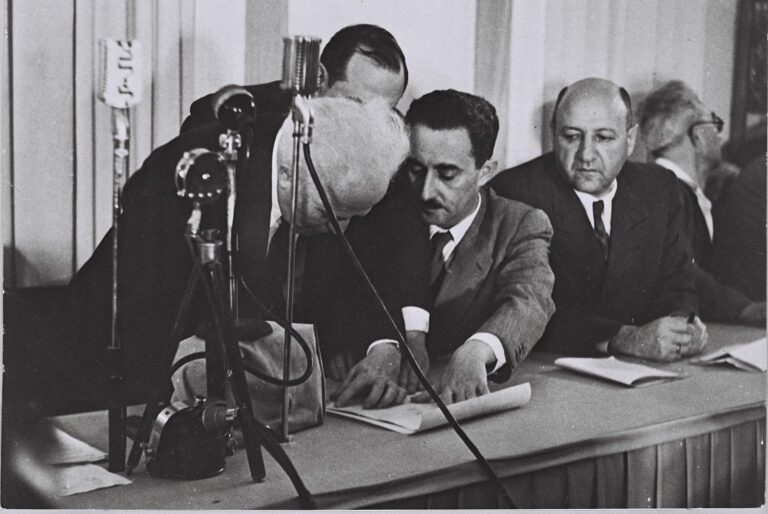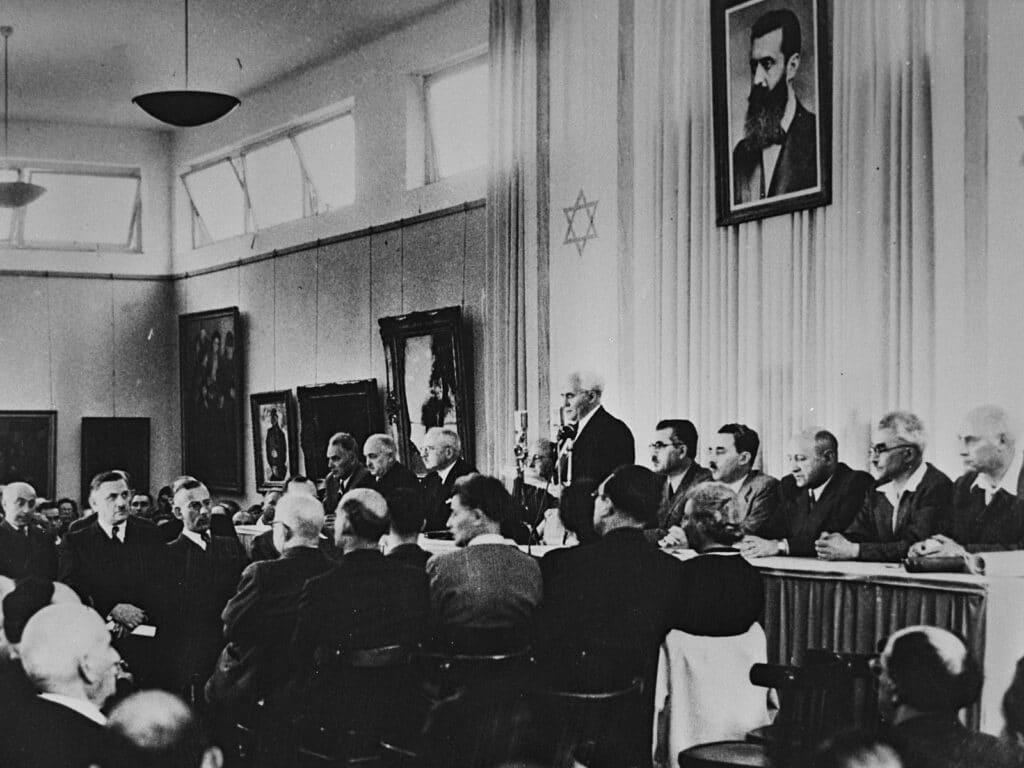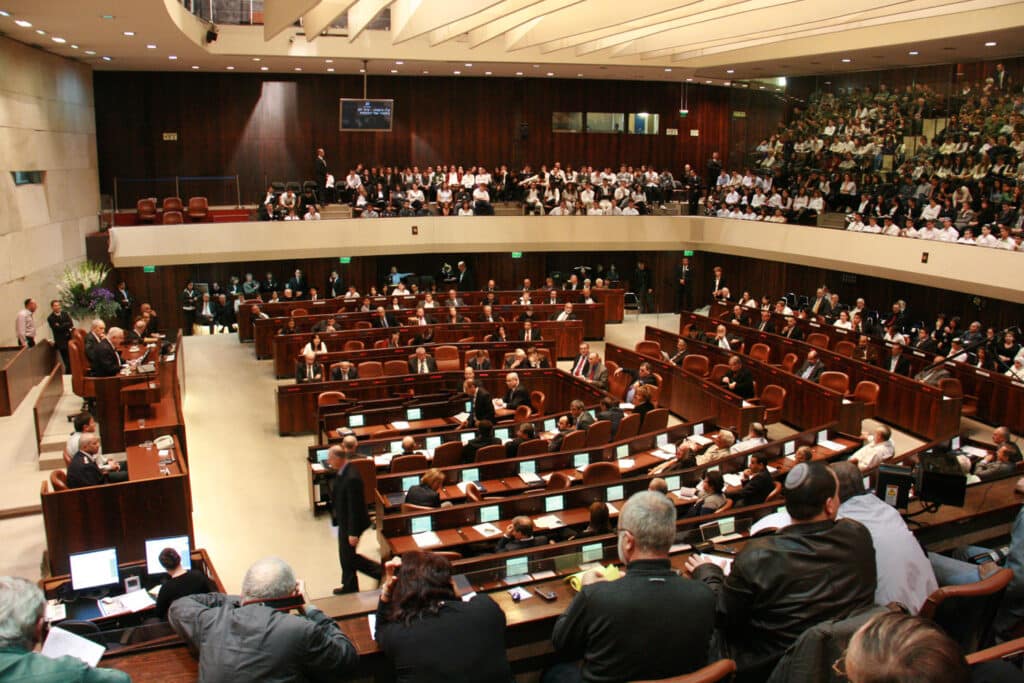
Israel is one of five countries that does not have a formalized written constitution, along with New Zealand, Saudi Arabia, the United Kingdom, and Canada, according to WorldAtlas.com.
This wasn’t the original plan, though. Israel’s Declaration of Independence explicitly calls for a constitution, and the first Knesset, elected on January 25, 1949, was supposed to create one.
They deliberated it for many months but the discussions reached a deadlock. “It rapidly became clear that…no constitution would be enacted; instead the Knesset would enact a series of Basic Laws that would in time be combined into a constitution,” historian Anita Shapira wrote in her book, “Israel: A History” (p. 182).
So, what happened to the idea of an Israeli constitution? And how did Israel’s lack of a constitution lead to the current crisis over the judicial reform?
What is a constitution in the first place?
Before we get to all of that, let’s take a step back and look at what a constitution even is.
According to the International IDEA, an intergovernmental organization that works to support democracy worldwide, there is no universally-accepted definition, but a constitution could be defined as a “higher law that cannot be unilaterally changed by an ordinary legislative act.”
Although the content of a particular constitution varies between countries, most of them describe “the basic principles of the state, the structures and processes of government, and the fundamental rights of citizens.”
The Israeli philosopher Micah Goodman explained the role of a constitution this way: “Laws limit civilians; a constitution limits governments.” Just like a law says that certain behaviors are illegal, a constitution says that certain laws are unconstitutional, like “illegal laws,” he added.
Annenberg Classroom, a civics education organization, elaborated on this: “A constitution of the people, written by their representatives and approved directly or indirectly by them, restrains or harnesses the powers of government to make sure they are used only to secure the freedom and common good of the people.”
There are different ways a constitution can limit the power of a government. It can enumerate or list its powers so that “the government may not assume powers that are not listed or granted to it,” according to Annenberg Classroom.
It can also separate the legislative, executive, and judicial functions of the government so that each branch checks the power of the others. In addition, “a broad range of human rights can be included in the constitution, which the government is prohibited from denying to the people.”
Why didn’t Israel create a constitution?
David Ben-Gurion, Israel’s first prime minister, “recognized the importance of a constitution as a central symbol of a state that educates its citizens to recognize the rule of law and the principle of equality before the law,” according to Shapira.
But for a combination of ideological, political and practical reasons, Ben-Gurion and Israel’s other founders couldn’t reach an agreement and didn’t create one. Here are five reasons why it didn’t happen.
1. Ben-Gurion believed in unrestrained majority rule.
In January 1950, as the first Knesset debated whether to create a constitution, Ben-Gurion gave an impassioned speech against it.
“Would our people agree to a situation in which seven judges…can cancel laws that the people desire?” he asked his colleagues. “Only the nation determines the constitution; that is, a constitution is what the people want and decide after an open inquiry and a vote.”
“A lifelong socialist, Ben-Gurion was certain that the future was progressive,” Times of Israel’s senior analyst Haviv Rettig Gur explained. “Hard-to-amend constitutions and powerful courts, he believed, served elites and reactionaries and preserved inequalities.”
The Israeli legislators decided to model their government on the British system, which has no constitution.
They considered the model of the American Constitution, which grants the Supreme Court the power to strike down laws it finds unconstitutional. “To Ben-Gurion, this authority seemed to bypass the wishes of the democratic majority and limit the government’s decision-making power,” Shapira wrote.
Rather than create a constitution, Ben-Gurion believed that the majority of the day should determine the rules.
“Every law is a product of its time,” he said. “There’s nothing eternal in law. What authority do we have to shackle the hands of those who will be elected to the Knesset in a year or in five?… We don’t have more wisdom than those who will come after us. Why should we be afraid that those who come after us won’t share our loyalties, won’t understand as we do the needs of the nation?”
2. Not having a constitution was in Ben-Gurion and the ruling Mapai Party’s political self-interest.
According to George Mason University Law School Professor Eugene Kontorovich, political considerations also played a role in Ben-Gurion’s thinking.
“He didn’t see any need to restrain his government,” Kontorovich told the Jerusalem Post. “Remember, [Ben-Gurion’s party] Mapai held power for 40 years. A constitution would introduce major restrictions to his own power.”
Some of the smaller parties, on the other hand, supported a constitution “since it would protect individual and minority rights against the coercive power of the majority,” Shapira wrote.
“The parties at both ends of the political spectrum — Mapam (United Workers Party) and Herut (liberty, the main right-wing party)…feared that without a constitution, a government headed by Mapai could enact laws damaging to the small parties,” she added.
3. Most of the Jews weren’t in Israel yet.
According to Israel Democracy Institute vice president Suzie Navot, another reason the founders didn’t create a constitution was that most of the Jews hadn’t made aliyah yet. It was unwise to create a constitution without the people’s involvement, Ben-Gurion argued.
The founding of Israel was unique in that “we established a country but the people of Israel were not here — they were dispersed all over,” Navot told Unpacked in an interview.
“So Ben-Gurion thought, ‘Let them come, let them make aliyah, and then we’ll see. If all of them come from America, we will make a constitution like America’s. If all of them come from Russia, perhaps we will have a different constitution.’” The discussion was put on hold.
4. Ben-Gurion wanted to avoid greater division between the religious and secular parties.

“From a political standpoint, Ben-Gurion was trying to avoid the internal struggles that accepting a constitution would produce, and he particularly wanted to avoid straining relations with the religious parties,” Shapira wrote.
“A constitution would raise the issue of making the halacha [traditional Jewish law] the source of law in Israel, or at least a demand to base the constitution on Jewish law, which the judicial system totally rejected,” she added.
The religious parties argued that the Jewish people already had a “constitution,” the Torah, and there was no need for another one written by human beings, Navot explained.
Also, in 1949, Israel was just emerging from its War of Independence, which began when five Arab countries invaded the new state. Given these external threats, it was particularly important to Ben-Gurion to preserve internal unity. He didn’t want to risk the division that could result from the process of constitution-building.
5. Some Knesset members questioned the need for a constitution.
According to Aeyal Gross, a constitutional law professor at Tel-Aviv University, some of the Knesset members simply didn’t believe a constitution was necessary. The system was built on the British system, and “the United Kingdom didn’t have a written constitution, so it was questioned why it was necessary,” he told the Jerusalem Post.
Ben-Gurion shared this general view, arguing that “loyalty to the rule of law results not from the existence of a constitution but from a general civic ethos,” Shapira wrote.
“Numerous countries have both glorious constitutions and regimes that are oppressive, tyrannical, and detrimental to the freedom of individuals and their rights,” she wrote, summarizing Ben-Gurion’s attitude. “Thus a constitution is not a panacea that guarantees democracy and human rights.”
The Harari Resolution

There is a debate among scholars about whether it would have been possible or not for Ben-Gurion to create a constitution. Some historians argue that the divisions between the religious and secular parties were so intense that there is no chance it could have happened.
Shapira, however, writing in 2012, argued that it might have been possible, adding, “From the perspective of sixty years on, this seems one of Ben-Gurion’s greatest mistakes.”
“A constitution’s importance goes beyond its purely legal aspect,” she wrote. “Such a document is a tool for creating a civic ethos… A constitution could have made a significant contribution to healing the rifts in Israeli society and stabilized universally accepted norms of governance.”
So, what happened next? On June 13, 1950, the First Knesset reached a compromise on the issue, known as the “Harari Resolution,” named after its sponsor, MK Yizhar Harari. Instead of a constitution, the Knesset would enact a series of Basic Laws that would be created over time.
The resolution states that the constitution should be “built chapter by chapter”:
The First Knesset instructs the Constitution, Law and Justice Committee to prepare a draft State Constitution. The constitution will be built chapter by chapter, in such a way that each will constitute a separate Basic Law. The chapters shall be presented to the Knesset when the committee completes its work, and all the chapters together shall comprise the Constitution of the State.
Between 1958 and 1988 the Knesset passed nine Basic Laws, all of which pertained to the structure of the government. In the early 1990s, the Knesset passed the first two Basic Laws pertaining to human rights, and today there are 13 in total.
How Israel’s lack of a constitution led to the crisis today

According to Professor Yaniv Roznai, co-director at the Rubinstein Center for Constitutional Challenges at Reichman University, because Israel doesn’t have a constitution that defines the relationship between the legislative, judicial and executive branches, “there’s a lack of legitimacy for the different branches.”
“Every branch tries to think towards its own end. The very fact that we don’t have acceptable rules of the game is the reason for all the problems. If we had a proper constitution with a proper Bill of Rights and judicial review, 90% of the problems would have disappeared,” he told the Jerusalem Post.
Guy Lurie, a research fellow at the Israel Democracy Institute, agreed, saying, “there’s no Basic Law legislation, and there’s no provision as to how the Court is to conduct judicial review of legislation. Some of the most basic issues that plague Israel today in terms of the relationship between the judiciary and the other branches of government are still not formulated.”
He added that an ideal outcome would be for the political parties to “come together and try to reach a consensus as to what should be the constitution of Israel.”
Yonatan Green, executive director of the Israel Law and Liberty Forum, had a different view of the situation. He argued that the problem is that the Supreme Court has grown overly powerful by its ability to strike down laws passed by the Knesset, “despite no actual constitutional anchor enabling such authority.”
Similarly, in a piece for Commentary Magazine, Elliott Abrams, chair of the Tikvah Fund, argued that the fact that Israel has no written constitution calls into question “the juridical and moral basis for Supreme Court rulings declaring Knesset decisions ‘unconstitutional.’”
Meanwhile, Micah Goodman said he hoped the current crisis would lead to a “constitutional moment… A constitutional moment means that Israel legislates a Basic Law of Legislation — which is something we didn’t have for 75 years — that defines and designs the rules of the game.”
Originally Published Feb 26, 2023 10:05AM EST
